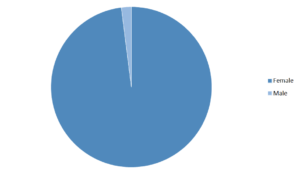- The different sectors and jobs in childcare
- Why it's a career industry worth joining
- The stigma surrounding men working in childcare
- Average earnings and working hours
- How you can progress in childcare
- What people working in childcare have to say
1. The Different Sectors of Childcare
This industry has various sectors for people to work in. You could take on a role in Early Years, Residential Childcare or within Children and Young People's Workforce. You should, therefore, consider the kind of childcare work you want to get involved in and each sector has a different route for you to take to be qualified. Read on for the key aspects of each area.
Early Years: Caring for a child who is 5 years old or younger.
Residential Childcare: Work in residential care with children in a care role.
Children and Young People's Workforce: You can work with children up to 19 years old - contributing to their care and development.
People who want to work in childcare could become a nursery nurse, childminder, sure start worker, special educational needs worker, childcare centre manager, preschool advisor and the list goes on. The role and sector you go in to depend on your level of experience.
2. Why it's a Career Industry Worth Joining
Working in child care is among the most rewarding jobs but it doesn't come without its challenges. If you love being around children, the industry will be perfect for you. You are making a real difference and every day is different. It's not like the average job in an office – you are caring, interacting and of course, inspiring. Each day, the things you say and do will make a real impact with kids being so impressionable.
In fact, one could argue that working in childcare, along with health care, is among the most important industries in society.
So, why might you consider it as a career? You'd be part of a growing system that is in serious need for enthusiastic and passionate workers.
3. The Stigma Surrounding Men Working In Childcare
Only 2% of early years' workers are male.
This statistic was found in a
study based on 400,000 early years educators.

Despite the need for more committed workers, men have generally turned off the idea of joining the industry. Childcare is unfortunately still considered as 'women's work'.
There are various reasons for the low percentage of men working in childcare and they were made apparent when a BBC article was shared on
The Learning Station's Facebook page.

The article was about a male nursery teacher and the stigma he faced. Facebook users shared their opinions in the comment section, highlighting and validating the interviewee's arguments about the stigma of male workers in childcare. Some users believed that there should be more male workers while others took a different viewpoint in that it is a 'woman's job'.
4. What Did People Say About This?
Robert Tapley wrote: "It's sexist. I had that problem when I worked in child care. Children should n have make nursery staff and teachers. Esperanto as some don't have a father at home."
In support of male workers like Robert, Natalie Pound had commented: "My child adores the ONE male at his nursery. True equality will be when we see people for their skills and qualities and not their gender!!"
Similarly, Sarah Nield said: "My son had the best key worker when he was in nursery - I was initially a bit surprised to find a man working there, but decided I was just having a knee-jerk reaction because it wasn't what I'd expected.
"Then he turned out to be exactly what my son needed, and a wonderful role model of a gentle caring man. He was so popular that by a few years later that nursery had several more male workers, which led to such a great healthy-feeling balance."
However, other commenters didn't have a positive outlook on the idea of male workers.
Patrick Roche wrote: "What real bloke grows up wanting to be a nursery teacher? Think about it or have you lost the plot as well."
Charley Nancy Buckingham commented: "Nursery is different to school nursery staff have to help children with toilet and accidents and I wouldn't want a male staff member helping my daughter at nursery with these issues."
Kai Dawson said: "First of all, there are more male paedophiles that we're aware of, so men are watched more closely with children.
"Secondly, childcare is often thought of as a "woman's job", so not many guys choose to study it.
"Thirdly, more nurseries should absolutely employ men who are qualified for the job."
5. Average Earnings and Working Hours
What does the average childcare worker earn?
- According to Total Jobs, in June 2018, the average salary for childcare jobs fell by 9% (£4,688)
- As of 2018, the average salary for childcare jobs is £21,000 per year, with the lower end earning £17,000 and the higher end earning over £31,000
- The average hours depend on what sector of childcare you work in. If you're a private nanny, it could be a 24/7 job. If you work in a childcare centre or nursery, it's likely that you will be working a normal 9-5 business day. Often, childcare workers will do overtime - it depends where you work whether you get paid for the additional hours or not
- Many childcare jobs have benefits including medical insurance, retirement packages and childcare for the employee's children
6. How You Can Progress in Childcare
Depending on your educational background, there are several routes to take to become a childcare worker. You must also consider the type of childcare you wish to work in (refer to section one).
You should find volunteering opportunities in the childcare setting you want to work in. Once you have some relevant employment, you can go on to a level 1 or level 2 course in childcare which involves coursework and observations where you're working.
Once you have worked somewhere for a while, you can go on to do a level 3 diploma in childcare, relevant to your setting.
The ultimate goal may be to work in management in your childcare setting. In order to work in management, you should get a Level 5 diploma. There are several
childcare courses to pick from.
7. What People Working in Childcare Have to Say
Rosie Faulkner, Early Years Educator Nursery Practitioner from South London: “I have always loved being around children and enjoyed babysitting so I decided to enrol in a childcare college course, I completed both level 2 and 3, alongside a Nursery placement. Since being qualified I have worked in a private day nursery.
"I would say the job is demanding, the hours are long and there is a lot of paperwork involved that most people don't realise. We have to keep a constant record of the children's development, this involves observations, planning and writing reports."
Read the
full interview to Rosie's her experiences and views.
Do you work in childcare and want to have your say? Feel free to comment below or email us at
[email protected].
 Despite the need for more committed workers, men have generally turned off the idea of joining the industry. Childcare is unfortunately still considered as 'women's work'.
There are various reasons for the low percentage of men working in childcare and they were made apparent when a BBC article was shared on The Learning Station's Facebook page.
Despite the need for more committed workers, men have generally turned off the idea of joining the industry. Childcare is unfortunately still considered as 'women's work'.
There are various reasons for the low percentage of men working in childcare and they were made apparent when a BBC article was shared on The Learning Station's Facebook page.
 The article was about a male nursery teacher and the stigma he faced. Facebook users shared their opinions in the comment section, highlighting and validating the interviewee's arguments about the stigma of male workers in childcare. Some users believed that there should be more male workers while others took a different viewpoint in that it is a 'woman's job'.
The article was about a male nursery teacher and the stigma he faced. Facebook users shared their opinions in the comment section, highlighting and validating the interviewee's arguments about the stigma of male workers in childcare. Some users believed that there should be more male workers while others took a different viewpoint in that it is a 'woman's job'.



 Student Login
Student Login My Account
My Account